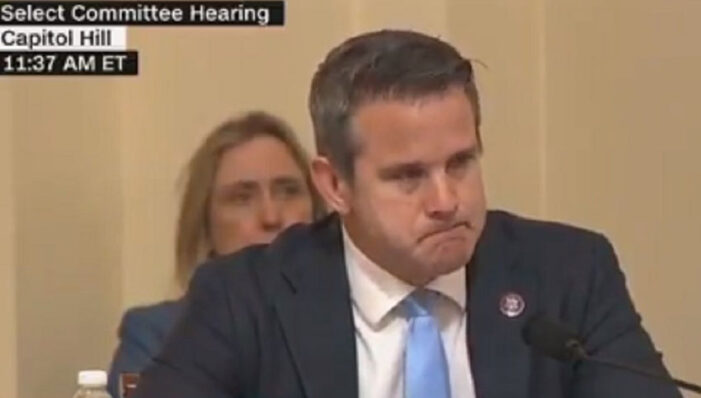by WorldTribune Staff, October 15, 2025 Real World News
Rep. Adam Kinzinger, a Republican, just wanted to help.
Investigators on the Democrat-run Jan. 6 Select Committee collected 30 million phone records between conservatives and the White House and offered the data to the FBI on the eve of the 2024 election, according to newly-released documents.

The surveillance was presented to the FBI led by Christopher Wray in late 2023 by Kinzinger, a GOP member on the J6 committee.
“The cache was offered to the bureau on the eve of the 2024 presidential election as evidence without requiring a warrant,” Just the News reported on Tuesday, citing an FBI document memorializing the offer.
According to the document, Kinzinger told the FBI that the phone data had been collected by then-former Rep. Denver Riggleman, an ex-Republican who was a staffer on the J6 committee and who later helped Hunter Biden’s legal team in its efforts to present the infamous laptop as Russian disinformation.
“He (Riggleman) had a contact and was able to obtain toll information including for White House root or switchboard numbers via congressional subpoena,” the FBI agents wrote in their memo summarizing the offer.
“The FBI memo does not reveal whether the bureau ever took Kinzinger up on his offer, but it does reveal the sheer magnitude of a phone surveillance project the Democrats ran by using congressional subpoenas to gather phone records about Americans’ contacts with the Trump White House,” the report said.
The newly-released memo on Kinzinger and Riggleman was uncovered by current FBI Director Kash Patel.
By December 2023, Kinzinger had already left Congress and the J6 committee he worked for had ended its investigation. But the 2024 presidential election between Donald Trump and Joe Biden was heating up with the first presidential primaries just weeks away from starting.
“Agents noted that Kinzinger seemed eager to help the FBI at that moment and that Congress had not figured out what to do with the massive collection of data,” the report said.
Riggleman’s book, “The Breach: The Untold Story of the Investigation into January 6th” detailed his descriptions of the Jan. 6 committee’s sweeping data collection efforts.
“Part of the work I oversaw on the committee was the painstaking process of matching phone numbers to names, utilizing powerful law enforcement databases and other clues as we could find them,” Riggleman wrote. “My files included information on thousands of sensitive texts, language for subpoenas and preservation requests, as well as technical plans and documents related to advanced analysis.”
Riggleman wrote that “our team analyzed phone numbers that belonged to those in the Trump family, rallygoers, rally planners, influencers like [Mike] Flynn, [Roger] Stone, and [Steve] Bannon; and many others.”
“In going through CDRs [call detail records] received via subpoena for DOJ-charged defendants, planners, and senior influencers, we had already spotted several phones that connected with White House phone numbers,” the book said. “This included some numbers known to the public, such as the general White House switchboard line. Others were not readily obtainable. We found those through leveraging sources and our own deep dives into the data.”
Kinzinger’s response to the new reporting was essentially that it is a nothingburger:
“Congress used lawful subpoenas to obtain phone metadata in 2021. It was routine. It was reported. It was discussed openly,” Kinzinger wrote in an Oct. 15 post to his Substack. “In 2023, I had a brief discussion with members of the FBI reminding them of this data if they needed it in their investigation. Regardless, they didn’t seem interested and that was that.”
